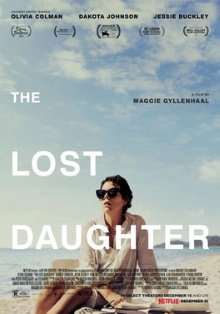This is Maggie Gyllenhaal’s debut feature film as a director and it’s a very strong entry. She doesn’t appear in it herself but there is plenty of other female star power in this woman-centric film. I’m not a fan of its central plot device since it’s transparently there just so that the main character has something that she can be involved in. But I do love it as an exploration of some of less discussed aspects of of motherhood including the sensation of it being a prison.
Leda Caruso, a middle-aged professor, checks into a holiday apartment on a Greek island by herself. At first she enjoys the quiet and relative isolation but then a large and noisy group arrives on the beach. She gets on the wrong side of them when they ask her to move to another umbrella but she stands her ground and refuses. They try to make amends later by offering her a piece of birthday cake and introducing themselves as a family of Greek Americans. Leda takes to watching an attractive young mother Nina who seems to be having trouble coping with her daughter Elena. This reminds her of the time when she was herself younger and feeling overwhelmed by two daughters constantly demanding her time and attention. During a moment of inattention, Nina loses Elena and start panicking. Leda is the one who finds Elena and returns her to her grateful. However Leda also secretly takes Elena’s doll and keeps it even as Elena makes a huge fuss over it, forcing the whole family to search the beach in vain for it.
The doll is of course the plot device in question. It makes the audience question for what possible reason Leda might have taken it and is a constant source of tension as we wait to see when the family realizes that she has stolen it. I found myself disliking it because it ends up being something of a red herring as its connection to the film’s real themes are so tenuous. In general, the film feels clunky in parts as many strings just don’t lead to anything that matters. Lyle the caretaker for example seems oddly intrusive for a while but nothing comes of it. There are numerous hints that the Greek American family have criminal connections which explain why they are so rich and that raises the stakes for Leda offending them, yet again this isn’t something that ties back to the film’s themes. I feel that these plot developments give Leda in the present something concrete to do but her real story unrolls in the drama of her younger self. There is a powerful resonance in her recognizing in Nina the same frustration that she felt but I still found myself wanting more scenes of her with her daughters in the past instead of the scenes in the present.
The theme of motherhood being unwanted and a prison for a young woman is underexplored in film and scarily brought to life here. There is absolutely no doubt that Leda loves her daughters just as Nina loves Elena, but there’s still a point where the constant and unending demand for attention and time gets overwhelming. The younger Leda acutely feels that she is still young and is conscious of how much she has to give up, having fun, her career, a relationship with another man who excites her more, in order to be the proper mother that society expects her to be. I also like how the film reminds you, even as you look at the older Leda being played by Olivia Colman who is not conventionally attractive, she is still the same woman who is sexually charged and enjoys dancing and partying. There’s nothing wrong in any of that of course yet these are not qualities that are usually associated with being a mother. I do feel that the film doesn’t explore the issue deeply enough. Having Leda simply state that she is an unnatural mother isn’t satisfying and not being able to see how she subsequently repaired her relationship with her daughters is frustrating. In general, I think this film tries too hard to feel like a thriller when instead it should embrace being an independent drama.
Quite a few established actors eventually try their hand at working behind the camera instead of solely being in front of it with varying levels of success. The Lost Daughter, despite its flaws, undoubtedly counts as a success and it’s doubly impressive as Gyllenhaal wrote the screenplay as well. We’ve already seen her being a producer as well as an actress in The Deuce tackling challenging material and it’s great to see her continue to expand into non-acting roles.
